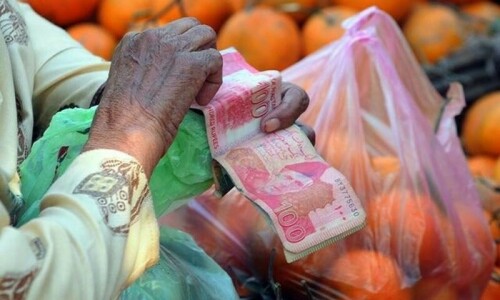Basmati rice is Pakistan’s celebrated export. But its production and exports have slipped of late.
The absence of research and development makes it extremely difficult for the rice sector to prepare for new challenges. The high status of basmati rice as a major export commodity conceals the fact that its contribution to the economy is below its potential. Without a strong commitment to elevating basmati rice as a strategic product, it will continue to be a victim of changing economic and environmental conditions.
A report prepared with the help of technical assistance from the Asian Development Bank (ADB) says the handling of the country’s premier export product as an ‘orphan’ is a tragedy. In the absence of research and development–based preparedness, the subsector is exposed to multiple risks from internal as well as external sources.
While the overall revenues from rice are stable, the lack of growth of basmati revenues should be a ‘red flag’ for policymakers. A reform programme is urgently needed because years of under-investment have weakened the system. However, some practical measures can reverse the trend, ADB says.
The overriding requirement is for the government to commit to a strategic road map that fills the research and development gap. It should create an environment that enables the public and private sectors to engage in commercially viable research. The rice sector is already paying the bills for its development.
The missing link is the utilisation of the resources. New efforts may be needed to bypass the existing setup if it is too costly or rigid to reform. But, without a reform of research and development, the future of the production and marketing of Pakistan’s basmati rice is uncertain, cautions the report.
The additional levy on exporters would not be needed if the current levy is channelled as intended. In 1999, parliament passed the Export Development Fund Act under which all exporters, including rice exporters, pay a surcharge of 0.25 per cent. This is deducted by the exporter’s bank from foreign receipts and submitted to the State Bank of Pakistan (SBP).
The bank transfers the collected cess to the Ministry of Finance. Under the Act, the finance ministry must transfer all proceeds of the Export Development Fund to the commerce ministry, which is responsible for disbursing the proceeds according to the stipulations of the Act.
In reality, the finance ministry has not been transferring all the amounts to the commerce ministry. As a result, the commerce ministry has a large sum due from the finance ministry. The cess collected in 2017 from rice exporters is equal to half of all expenditures on rice research and development for the last 20 years. The Act specifies that the cess funds can be used for research and development, technical institutes, market and product development and other areas related to export enhancement.
While the export segment of the value chain benefits most from rice in terms of private profits, exporters still expect the public sector to fund core research and development. The inability to view the whole value chain means that the billions of rupees that have been collected from rice exporters in the last 20 years have not been used for basic research and development. The vision of the Export Development Fund or the exporters is not broad enough to realise that research and development across the value chain will contribute to increased export revenues.
The amount of funding required to reviving growth in basmati production and exports is not huge. Recent policy work, especially in Punjab, has recognised the need for investment in research and development. Funds are available in the government’s annual development budget.
The study suggests that the Malaysian Palm Oil Board, a government body, is a good model of how the coordinated efforts of a whole value chain can improve the prospects of a particular crop. The board has made Malaysian palm oil an international benchmark product and has invested heavily in research and development and commercialisation.
Pakistan can create a basmati rice board based on the Malaysian model and funded by the rice exporters’ contributions to the Export Development Fund. As is the case for all research and development in the country’s agriculture, basmati research and development in rice suffers from a low quality and quantity of funding. The core issue relates to the absence of policy commitment and the recognition of the need to invest a minimum amount consistently. The irony is that the amount of research investment needed is tiny compared with its potential return, it says.
Insufficient investment in agriculture research and development in Pakistan has resulted in suboptimal yields and a lower-than-potential productivity growth curve of its basmati rice varieties. Pakistan is the globe’s fourth largest rice exporter in terms of quantity and rice is the country’s largest export earner after cotton. This status was achieved by liberalising the rice trade in the early 1990s and allowing the private sector to operate freely.
India is Pakistan’s only competitor in the export market for basmati rice. But basmati has to compete with other varieties in the global marketplace. Although Pakistan inherited good rice varieties and managed to improve on them, the country has not made significant progress during the last 20 years.
Published in Dawn, The Business and Finance Weekly, February 25th, 2019














































